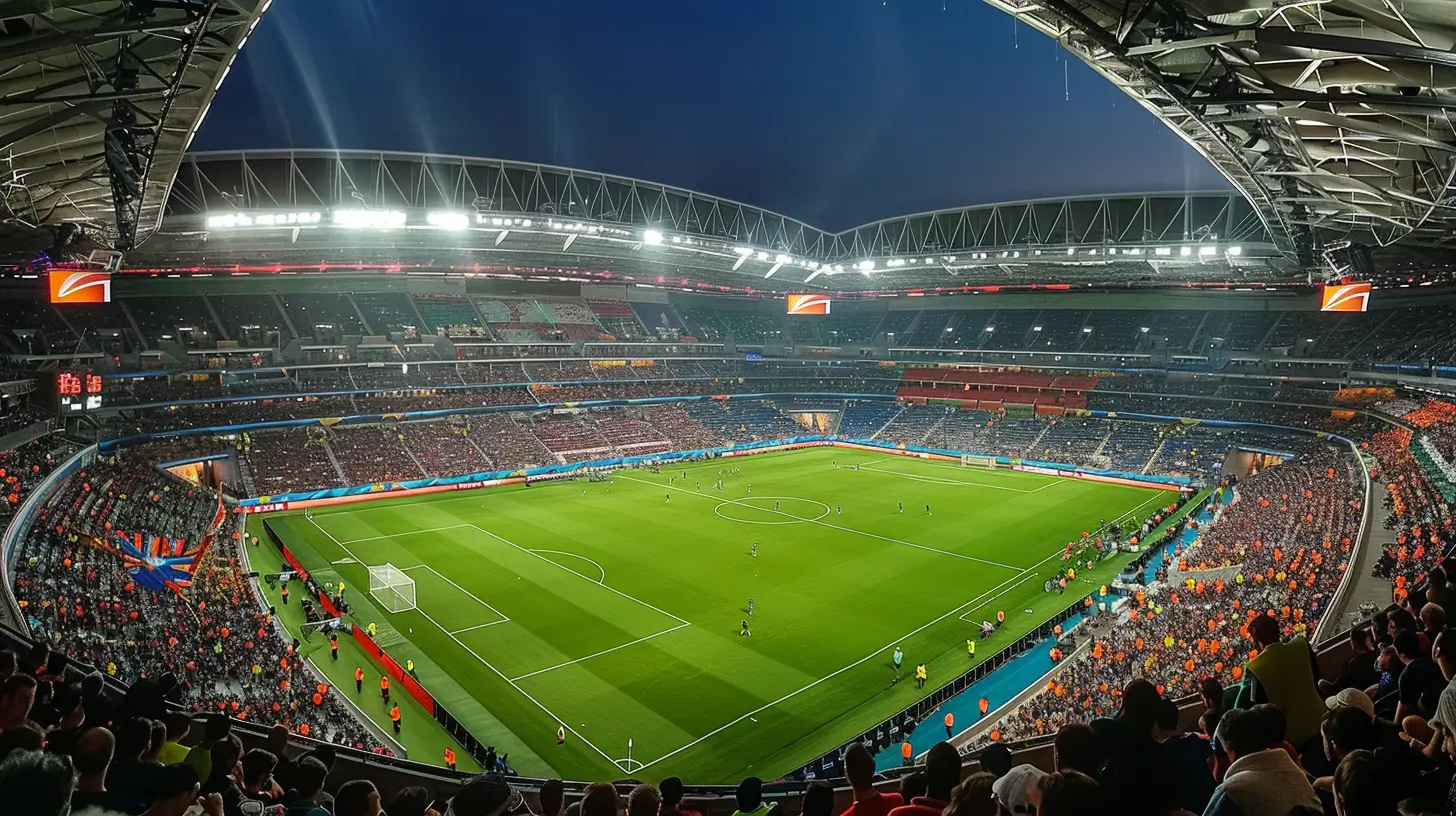What We Can Learn from Relegation and Promotion in Global Football Leagues
10 December 2024
Relegation and promotion — two words that stir up a whirlwind of emotions in football fans around the world. They are the heartbeat of many global football leagues, ensuring no team can rest on its laurels for too long. If you’ve ever followed leagues such as the English Premier League (EPL), La Liga, Serie A, or the Bundesliga, you know that the stakes are always high. But beyond the nail-biting tension and dramatic last-minute goals, there's a lot we can learn from this system.
Whether you're a football fan or just someone who enjoys learning about different sports systems, the concept of relegation and promotion has lessons that go beyond the pitch. Let’s dive into what these two systems are, why they matter, and what life lessons can be drawn from them.

What Is Relegation and Promotion?
Before we get ahead of ourselves, let’s make sure we’re all on the same page. Relegation and promotion are terms used in sports leagues, particularly in football (or soccer, depending on where you’re from), to describe the movement of teams between different divisions based on their performance.In most global football leagues, teams are divided into multiple tiers or divisions. At the end of each season, the teams that perform the best in the lower division are “promoted” to the higher division. Conversely, the teams that perform the worst in the higher division are “relegated” to the lower one.
To put it simply:
- Promotion is the reward for success.
- Relegation is the punishment for failure.
For example, in the English Premier League, the bottom three teams at the end of the season are relegated to the EFL Championship (the second tier), while the top two or three teams from the Championship are promoted to the Premier League.
But Why Does It Matter?
At first glance, this might just seem like a way to keep things fresh. But dig a little deeper, and you'll see how these mechanisms can teach us about resilience, competition, and growth, not just in football but in life.
Lesson 1: The Importance of Accountability
One of the most striking aspects of relegation and promotion is the level of accountability it demands from teams. There’s no room for complacency. If a team underperforms, there are tangible consequences — they get dropped to a lower league.Imagine if life worked like that. If you slacked off at your job, you wouldn’t just get a stern talking-to from your boss; you’d be demoted to a lower position or transferred to a less prestigious department. The fear of relegation keeps teams (and players) on their toes, constantly striving to improve.
On the flip side, promotion rewards hard work and success. Teams that perform well aren’t just patted on the back — they’re given the opportunity to compete at a higher level. It’s a clear-cut example of meritocracy at work.
This is a powerful lesson about accountability. Whether in sports, work, or life, knowing that your actions have real consequences can be a great motivator. You either rise to the occasion or risk falling behind.

Lesson 2: Embracing Failure as a Path to Growth
Relegation isn’t the end of the world, even though it might feel like it. In fact, some of the best football clubs in history have been relegated at some point — only to come back stronger. Teams like Manchester City and Juventus have experienced relegation but have bounced back and achieved tremendous success later on.The key here is resilience. Relegation forces teams to reassess, re-strategize, and rebuild. Sometimes, being knocked down to a lower division gives clubs the breathing room they need to reorganize and come back with a vengeance.
It’s a great metaphor for life. We all fail at some point, right? Whether it’s a failed project, a relationship that didn’t work out, or a personal goal we didn’t achieve, failure is part of the journey. But relegation teaches us that failure isn’t permanent. It’s just a temporary setback that can fuel future success.
Think of it like a slingshot. Sometimes, you need to be pulled back in order to be propelled forward.

Lesson 3: Competition Breeds Innovation
One of the most exciting things about relegation and promotion is how it fosters competition. Every team, whether they’re at the top of the table or fighting at the bottom, has something to play for. This competitive environment pushes teams to innovate, try new tactics, invest in better players, and improve their training facilities.Without the threat of relegation, some teams might become complacent, content to sit in the middle of the pack without striving for greatness. But when there’s something at stake, teams are forced to think outside the box. Whether it’s a scrappy underdog team trying to stay in the top league or a lower-tier team fighting for promotion, the competition makes the game more dynamic and unpredictable.
Innovation thrives in high-pressure environments. Just like in business or any other competitive field, when you know that the stakes are high, you’re more likely to come up with creative solutions and push the boundaries.
Lesson 4: Building a Strong Foundation Matters
One of the reasons why some teams are able to bounce back after relegation — or make the leap to higher leagues — is because they have a strong foundation in place. This includes good management, strong financial backing, a solid youth academy, and loyal fans.Clubs that have these pillars in place can weather the storm of relegation and come back stronger. On the other hand, teams that rely solely on short-term success or expensive transfers often find themselves struggling when things go south.
This is a valuable life lesson. Whether building a business, a career, or even personal relationships, having a strong foundation is critical. It’s easy to get caught up in short-term wins, but true, lasting success comes from ensuring that the core elements — good leadership, strong values, and long-term planning — are in place.
Lesson 5: Adaptability Is Key
Football is a fast-paced, ever-changing sport, and teams that succeed are often the ones that can adapt to new challenges. Tactics evolve, new players come in, and competition changes. Teams that are too rigid in their strategies often find themselves struggling, particularly when faced with the pressures of relegation.The same is true in life. Adaptability is key to surviving and thriving in a constantly changing world. Whether it’s learning new skills, adapting to new technologies, or adjusting to unexpected challenges, those who can evolve and grow are the ones who succeed in the long run.
In many ways, the promotion and relegation system reflects the pace of modern life. If you’re not continuously improving and evolving, there’s a good chance you’ll be left behind.
Lesson 6: Underdogs Can Achieve Great Things
One of the most magical aspects of the promotion and relegation system is the opportunity for smaller or lesser-known clubs to rise to the top. Leicester City’s 2015-2016 Premier League win is perhaps the most famous example of this. A team that had been fighting relegation the previous season went on to defy all odds and win the title — a feat many thought was impossible.This story resonates with so many people because it’s a classic underdog tale. It’s a reminder that, no matter how stacked the odds may seem, hard work, determination, and a bit of luck can lead to incredible success.
In life, we often feel like the underdog. Whether it’s a job promotion we don’t think we’re qualified for or a personal goal that feels out of reach, it’s easy to doubt ourselves. But just as Leicester City proved, underdogs can achieve great things if they keep pushing and refuse to give up.
Lesson 7: Community and Fan Loyalty Matter
One often overlooked aspect of relegation and promotion is the impact it has on a team’s fanbase. Relegation can be devastating for fans, but it’s in these tough times that true loyalty shines through. Fans who continue to support their club, even in the lower divisions, play a crucial role in helping the team rebuild and regain its former glory.This speaks volumes about the importance of community and support systems in life. Whether you’re going through a tough time at work or facing personal challenges, having a strong support system can make all the difference. Just as football clubs rely on their fans, we all rely on the people around us to help us through difficult times.
Conclusion: More Than Just a Game
Relegation and promotion in global football leagues are more than just a system for organizing teams. They’re a reflection of life’s ups and downs, teaching us valuable lessons about accountability, resilience, competition, and the importance of building a strong foundation.As fans, watching teams fight for survival or chase promotion reminds us that nothing is guaranteed in life. Success must be earned, failure isn’t final, and sometimes, the underdog can come out on top.
So, the next time you’re watching a relegation battle or a promotion playoff, remember that there's more to it than just football. You’re witnessing life lessons in action — lessons that apply both on and off the pitch.
all images in this post were generated using AI tools
Category:
Sports LeaguesAuthor:

Preston Wilkins
Discussion
rate this article
20 comments
Preston Price
Relegation and promotion reveal the stark realities of competitiveness and financial disparity in football, challenging clubs to adapt or face demise.
April 5, 2025 at 8:58 PM

Preston Wilkins
Absolutely! Relegation and promotion highlight the urgent need for clubs to innovate and manage resources wisely to thrive in an increasingly competitive landscape.
Bernadette McRae
Relegation and promotion remind us of the resilience in sports and life. They teach us about hope, hard work, and the strength to rise again, inspiring us all to never give up.
March 23, 2025 at 1:59 PM

Preston Wilkins
Absolutely! Relegation and promotion embody the essence of resilience, demonstrating that persistence and hope can lead to new opportunities. They inspire both players and fans to embrace challenges and strive for success.
Rivera Oliver
Relegation and promotion serve as powerful motivators in global football, emphasizing resilience and adaptability. They reflect the dynamic nature of competition, reminding clubs and fans alike that every season holds the potential for triumph or heartbreak.
February 11, 2025 at 3:59 AM

Preston Wilkins
Thank you for your insightful comment! Indeed, relegation and promotion highlight the unpredictable nature of football, driving clubs and fans to embrace both challenges and opportunities each season.
Uma McFadden
Ah yes, relegation and promotion—the thrilling rollercoaster where teams learn life lessons while fans experience heart palpitations. Who knew sports could be such a masterclass in heartbreak and fleeting glory? What a ride!
February 2, 2025 at 3:31 AM

Preston Wilkins
Absolutely! Relegation and promotion truly encapsulate the highs and lows of sports, offering invaluable lessons in resilience and hope. It's a journey that resonates far beyond the pitch.
Blaine McLoughlin
Absolutely love the insights on relegation and promotion! It's a thrilling reminder of how every match counts and every team has a chance to shine! 🌟⚽️
January 28, 2025 at 1:59 PM

Preston Wilkins
Thank you! I'm glad you enjoyed the insights. Every match truly is pivotal in shaping the journey of each team! 🌟⚽️
Sofia McNulty
Great insights on the impact of relegation and promotion in football! Your analysis highlights the resilience and opportunities it creates for clubs, players, and fans alike. Well done!
January 24, 2025 at 12:23 PM

Preston Wilkins
Thank you! I’m glad you found the insights valuable. The dynamics of relegation and promotion truly shape the football experience for everyone involved.
Giselle Lawrence
This article beautifully highlights the dynamic nature of global football leagues, illustrating how relegation and promotion shape team strategies, fan loyalty, and the competitive landscape. Understanding these elements not only enhances our appreciation of the sport but also provides valuable lessons in resilience and adaptability across all areas of life.
January 19, 2025 at 1:27 PM

Preston Wilkins
Thank you for your insightful comment! I'm glad you found the article captures the essential role of relegation and promotion in shaping not just football, but also broader lessons in resilience and adaptability.
Niva McGuffey
Relegation and promotion are the ultimate reality checks in football; they remind us that glory is fleeting, and every match matters. In a world obsessed with status, these leagues teach resilience, ambition, and the beauty of second chances. Game on!
January 15, 2025 at 4:21 AM

Preston Wilkins
Absolutely! Relegation and promotion truly highlight the stakes in football, emphasizing the importance of every match and the resilience required to succeed. It's a powerful reminder of the sport's unpredictability and the value of perseverance.
Kenzie Hines
Relegation and promotion highlight the volatility of team performance, emphasizing the need for consistency, investment, and strategic planning in football.
January 11, 2025 at 5:44 AM

Preston Wilkins
Absolutely! Relegation and promotion serve as powerful reminders of the critical importance of consistent performance, strategic investment, and long-term planning for success in football.
Celeste Wilcox
This article beautifully captures the bittersweet nature of relegation and promotion in football. It’s a poignant reminder of resilience, hope, and the relentless pursuit of excellence. Each team's journey teaches us about perseverance, unity, and the undying spirit of the game. Thank you for such an insightful perspective!
January 1, 2025 at 8:42 PM

Preston Wilkins
Thank you for your kind words! I'm glad the article resonated with you and highlighted the valuable lessons from football's ups and downs.
Sylas Barrett
Relegation and promotion reflect clubs' performance accountability, fostering competitive balance while enhancing fan engagement, ultimately shaping the dynamic landscape of global football.
December 27, 2024 at 8:25 PM

Preston Wilkins
Thank you for your insightful comment! Indeed, relegation and promotion are vital in maintaining competitive balance and boosting fan engagement in football.
Octavia Moses
Relegation promotes resilience and growth.
December 25, 2024 at 12:49 PM

Preston Wilkins
Absolutely! Relegation can be a crucial turning point, fostering resilience and encouraging teams to innovate and improve for future success.
Thalwen McClendon
This article raises intriguing insights into the dynamics of promotion and relegation in football. It highlights how these systems not only impact team performance but also fan engagement and community identity. I'm curious to see how these lessons can be applied to other sports leagues worldwide!
December 22, 2024 at 8:59 PM

Preston Wilkins
Thank you for your thoughtful comment! I agree—promotion and relegation offer valuable lessons that could enhance fan engagement and community ties in various sports leagues. Excited to explore these ideas further!
Abigail Pratt
Relegation and promotion highlight the relentless pursuit of excellence in football. They teach us that resilience, adaptability, and strategic planning are crucial—not just in sports, but in life’s competitive landscape.
December 19, 2024 at 4:40 AM

Preston Wilkins
Absolutely! Relegation and promotion not only showcase the stakes in football but also offer valuable life lessons in resilience and adaptability that apply beyond the pitch.
Cooper McCarthy
Great insights! Relegation and promotion bring excitement!
December 13, 2024 at 1:48 PM

Preston Wilkins
Thank you! I'm glad you found the insights valuable. Relegation and promotion truly do add a unique thrill to the game!
Bear Martin
Relegation and promotion: where the stakes are high, the drama is real, and every match feels like a life-or-death episode of your favorite reality show. Who knew football could double as a thrilling soap opera? Tune in!
December 13, 2024 at 5:14 AM

Preston Wilkins
Absolutely! The intensity of relegation and promotion not only enhances the excitement of football but also teaches us valuable lessons about resilience, competition, and the unpredictable nature of sports—much like life itself.
Clover McTavish
Relegation and promotion are key to the competitive spirit in football, fostering resilience and adaptability. They remind clubs and fans alike that success is not guaranteed; consistent performance and strategic planning are essential for survival and advancement in the global game.
December 11, 2024 at 8:04 PM

Preston Wilkins
Absolutely! Relegation and promotion truly highlight the importance of consistency and strategic planning, driving both teams and fans to strive for excellence in every match.
Nixie Wagner
Relegation and promotion in global football leagues offer critical lessons in resilience, adaptability, and the importance of maintaining competitive integrity. These dynamics foster growth, enhance local talent, and create a thrilling atmosphere for fans and players alike.
December 11, 2024 at 1:46 PM

Preston Wilkins
Thank you for your insightful comment! I completely agree—relegation and promotion not only shape the competitive landscape but also inspire growth and resilience within teams and communities.
Finnegan McAleer
Relegation and promotion in football: the ultimate game of musical chairs! Just when you think you’re safe, someone yanks the seat out from under you. Remember, it’s all fun and games until you’re in the basement!
December 10, 2024 at 8:37 PM

Preston Wilkins
Absolutely! Relegation and promotion highlight the unpredictable nature of competition, reminding us that success is never guaranteed and requires constant effort.
Mason Peterson
Relegation and promotion are vital to the integrity of global football. They foster competitiveness, encourage youth development, and ensure that every match matters. Embracing these dynamics elevates the sport, making it thrilling and unpredictable.
December 10, 2024 at 12:49 PM

Preston Wilkins
Absolutely! Relegation and promotion are essential for maintaining excitement and competitiveness in football, driving clubs to innovate and develop talent continually.
MORE POSTS

The Future of VAR: How New Guidelines Are Shaping Decisions

MMA’s Most Intense Rivalries and Their Impact on the Sport

Coping with the Pressure to Win: Strategies for a Balanced Mindset

How Sports Psychology Can Help Prevent Burnout

Southpaw vs Orthodox: Which Stance Reigns Supreme?

How to Build a Balanced and Effective Push-Pull Workout Routine

Injuries and Comebacks: Supporting Teammates Through Tough Times

The Challenges of Playing Cricket in Extreme Weather Conditions

How Social Media is Changing the MMA Landscape

The Importance of Flexibility in Preventing Sports Injuries

Building Resilience: Overcoming Adversity as a Team

Standing Tall in Defeat: Athletes Who Exemplify True Sportsmanship